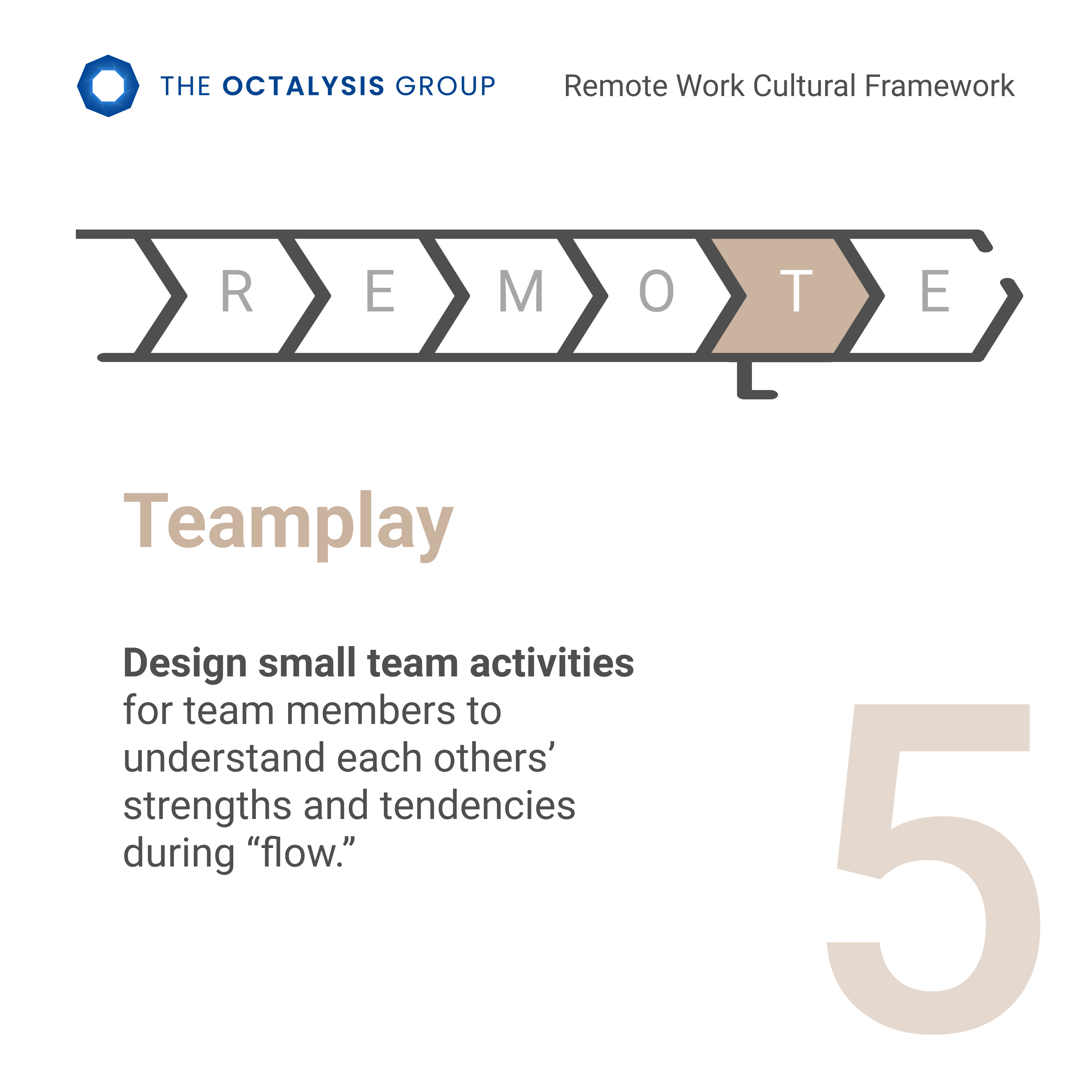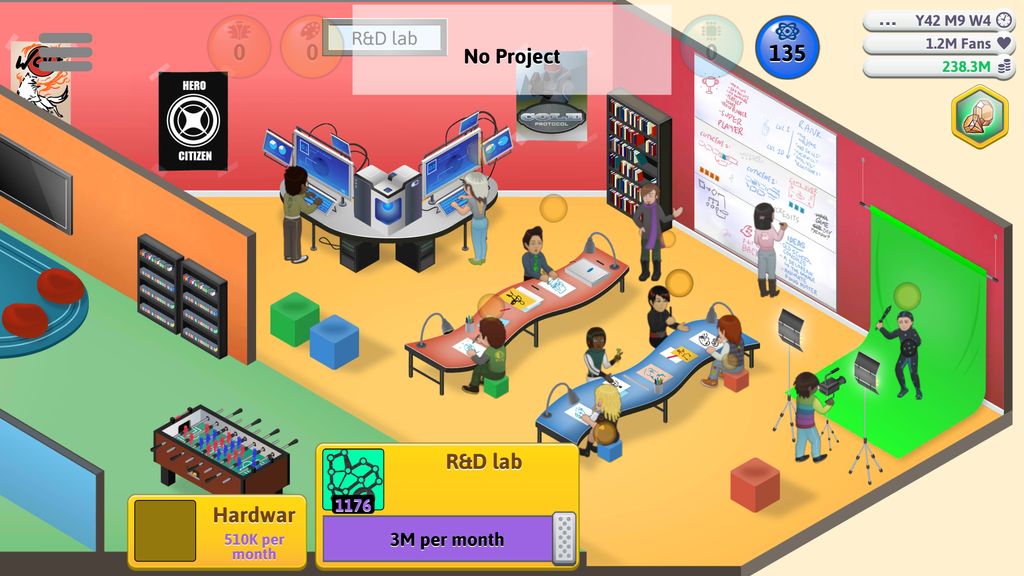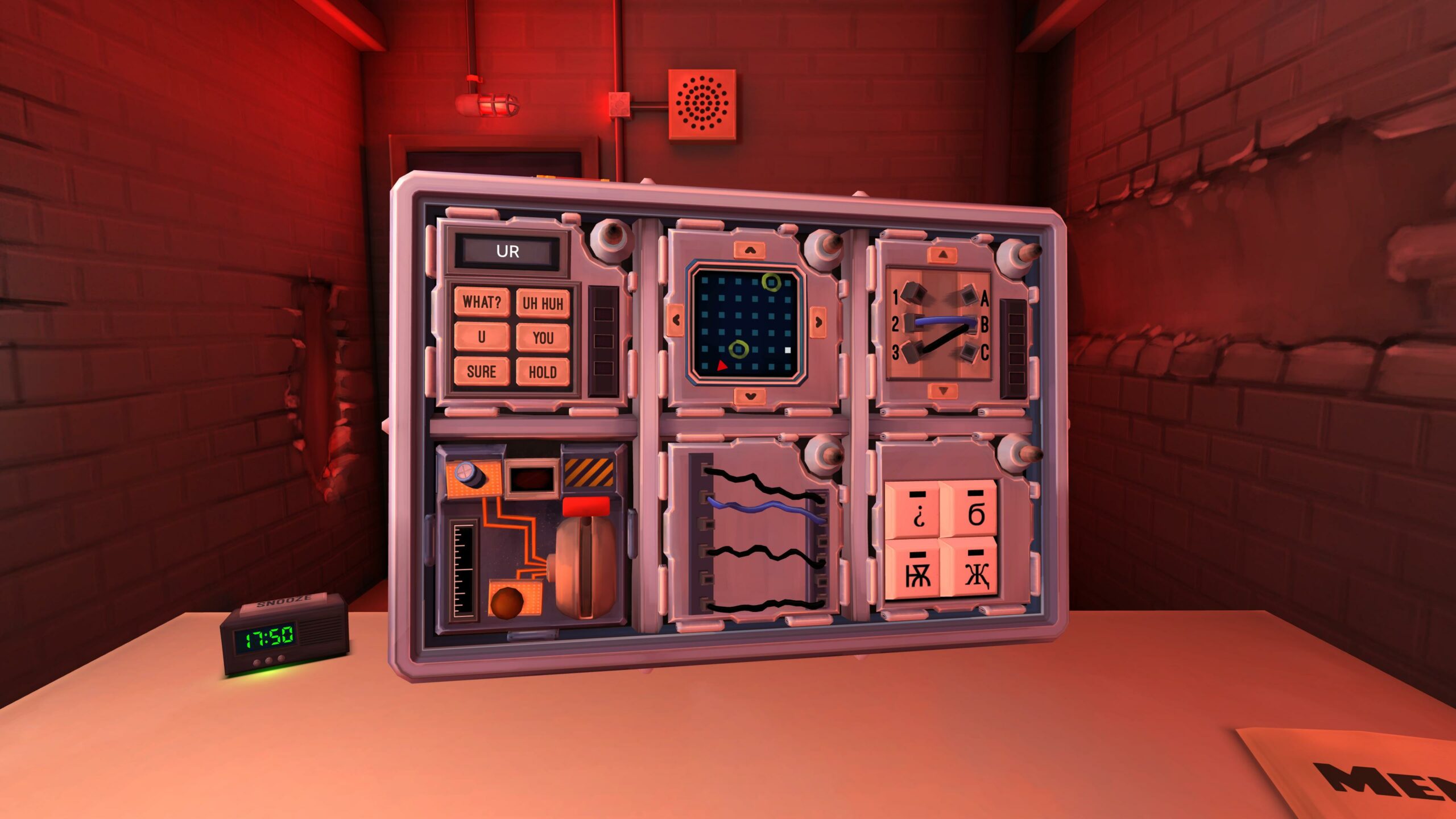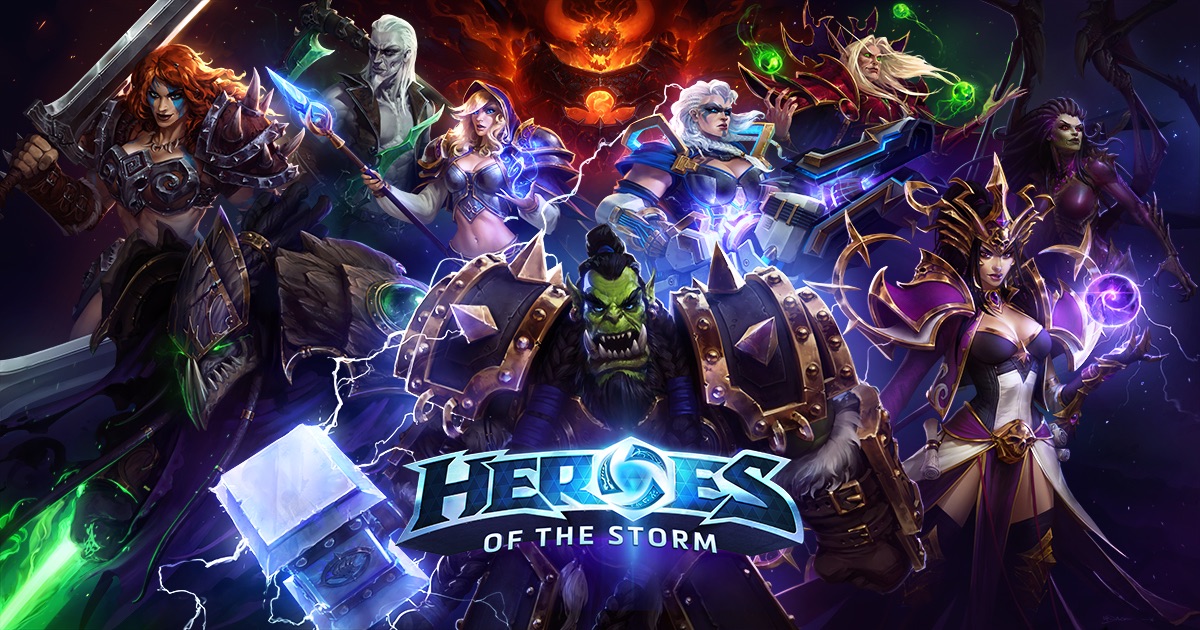REMOTE Step 5: Design small team activities for team members to understand each others’ strengths and tendencies during “flow.”
In our previous episode (on Openness) we delved into Remote Work setup design that promotes openness and vulnerability to create trust between team members and informational transparency. In TEAMPLAY it is all about creating a Remote Workplace that facilitates team activities to generate mutual understanding, bonding and that highlight strengths and weaknesses of colleagues.
It is widely accepted that team activities are beneficial for workplace cohesion, cooperation and trust. We also know that team interactivity outside formal work settings greatly increases job satisfaction and productivity. One MIT study found that the best predictors of productivity were a team’s energy and engagement outside formal meetings. This study saw productivity increases of 20% and job satisfaction increases by 10% by implementing non-formal social engagement activities.
It is important to note that the most valuable form of non-formal communication is done face-to-face. Email and texting are the least valuable. In the study 35% of the variation in a team’s performance could be accounted for simply by the number of face-to-face exchanges among team members.
That’s all fine in a physical workplace, where coworkers go to “Happy Hours,” play Ping-Pong in the office lounge, or just have a chit-chat about the latest show at the watercooler.
But how do you cater for this casual face-to-face interaction in Remote Work Setups? How do you draw people together to create valuable and insightful time together? I mention “insightful’ here as non-formal interaction will show more of a colleague’s true nature than formal interaction. More importantly, how can you make those meetings engaging?
Playful Team Interaction and Insights
You may already know from Octalysis that we can learn valuable lessons from successful games. The Octalysis Group has shown that these valuable lessons can be transformed into highly engaging applications. In the same manner we can position targeted Teamplay to achieve more casual face-to-face interaction in REMOTE Work Setups.
So why are game-like interactions important for REMOTE companies? Well, they:
- are fun and lead to higher productivity (as the MIT study above showed);
- teach us about strengths and weaknesses of our colleagues. People tend to show a high degree of their dominant personality traits during games;
- influence desired behavior during and after the Teamplay experience
The last two points are particularly important as there is no physical face-to-face time to ‘feel out’ character traits of colleagues and influence their behavior.
Create Rapport and Mutual Understanding
It is important to understand your colleagues’ ‘strengths and weaknesses’. Not to abuse or manipulate them based on how they perform during games, but to inform you what approach (or incentive) works best to engage the particular individual. Role plays have of course been used for decades to test job applicants’ behavior in dynamic and challenging settings, so this is not something new. What will be new for companies is to facilitate and plan game interaction on a weekly basis.
Influencing Desired Behavior
When you select games for people to play online, ensure you pick games that bring out the character traits that benefit team cohesion, cooperation and other traits that suit your company culture. Avoid games, like Secret Hitler or Epic Mafia, that encourage people to cheat or hide facts from colleagues. A well known Stanford study showed that people tend to act in accordance to the role they play in games: also known as the Proteus Effect. So having a deceitful game character may enforce negative behaviour. It can be difficult, post game, for colleagues to trust peers who have shown themselves to be very good at deceiving or fooling them.
Importantly, the study shows that the role that people play during a game tends to have a much longer effect after the game ends. So make sure that you pick games that mimic behaviors that you would like to see perpetuated. Try to go for games that empower team collaboration rather than cut throat competition.
TOOLS LAYER
When you think about planning for Teamplay don’t think it is necessary to buy your staff Nintendo Switches or Playstations. There is a whole range of online play opportunities that can be played from your laptop or desktop. And many of these games can actually be played without downloading game content (game downloads may not be possible due to your company’s security regulations).
Online Board Games
Board games are well suited for social interaction. Mostly they are at a slightly slower pace, and most can be learned quite quickly. This means that players from very different experience levels can often play together well. In contrast, many video games require more practice and it is often more difficult to create equal match ups.
It is easy to play Board Games online through platforms such as TableTopia, Table Top Simulator or Board Game Arena. No game clients have to be downloaded and there is never a need to upgrade or update the game.
Other Online Team Games
There are a host of other games that teams can play that increase bonding and cooperation. The best games are those where people have to work together to achieve a common goal.
One of the favorite Teamplay games in The Octalysis Group is Keep Talking and Nobody Explodes. In that game one individual sees the “bomb on a fuse” while the rest can only access a large PDF manual of “if-then instructions” to disarm all types of bombs. The “bomb disarmer” needs to use voice tools to communicate very clearly every detail s/he sees on the bomb while the “remote experts” scurry through the huge PDF file to give step-by-step instructions, all under significant time pressure.
The game improves communication, delegation and trust under time pressure – 21st century skills that every worker should practice, but mostly isn’t given space for at work. There is also a GREAT feeling when a “remote expert” gives an instruction and “bomb disarmer” successfully moves to the next step. They both felt they understood each other and resolved a great crisis together, something you want your teammates to feel regularly. Since scenarios like that don’t often happen in our day-to-day jobs, we can rely on games like Keep Talking and Nobody Explodes to bond people through it.
Another game that is great for REMOTE team bonding is Skribbi. Skribbi is like an online Pictionary, where you have to draw something and others have to guess what you draw.
My business partner Yu-kai is really fond of this particular game:
“Sometimes I have to draw something super abstract (like “cousin”). And I’m drawing some random crap and I think no one could guess it. I’m feeling bad and feel we just burned a round. Then somehow a teammate guesses it correctly. That’s an amazing moment. You felt your worthless gibberish was understood. YOU were understood.”
That type of bonding and profound connection is difficult to recreate in a work environment, let along a remote workplace environment.
Online Video Games
Video games offer a more immersive experience than board games, through better feedback mechanics, audio effects and visuals. The only issue is that many of these games require players to be at roughly the same level to make it work. There is not much fun for someone to play the MOBA (Multiplayer Online Battle Arena) Game League of Legends with veteran players. The learning curve is just too steep for these kinds of games to be inclusive enough for true team play.
Also, many online video games reward mouse-keyboard reflexes instead of skills that are directly connected to the workplace such as creativity or problem-solving. It’s important to pick the right games that enhance the right attributes for your workplace.
Some online video games also take a long time to play, which could cut into actual work and deliverable hours. It is better to pick games that have quick rounds (5-20 minutes) instead of drawn out rounds (40-60 minutes).
For example, The Octalysis Group plays Heroes of the Storm over League of Legends because within the MOBA environment, League of Legends usually requires 40+ minutes to finish a game, and is a lot more about individual performances leading to a win; Heroes of the Storm only requires 25-30 minutes per round and is more about teamwork and mutual coordination.
Of course, as a leading Gamification and Behavioral Design company, we benefit more from these Teamplay activities so we could play games that are longer than the 5-20 minute range mentioned above.
CULTURE LAYER
Cultural changes are the biggest changes that many companies will need to make in order to enjoy the full benefits of Teamplay. In physical (but also still REMOTE) set ups, playing games in ‘the boss’ time is just not acceptable.
“We are a serious business. Why would I pay people to play games?”.
“What if they play these Teamplay games the whole day?”
“How does this game stuff help my productivity targets in any way?”
One of the main things that companies are missing is how gameplay (as part of non-formal team interaction) boosts team morale and reduces staff turnover. Turnover cost (the cost of replacing an employee that left) is a cost factor often overlooked by managers.
Turnover can cost employers 30 percent of an employee’s annual salary. The culprit? The hiring of a replacement. So if the employee earned a median salary of $45,000 a year, this would cost the company $15,000 per person. And these costs do not even factor in productivity loss from bringing the new hire up to speed.
Teamplay is essential business
Rather than looking at games as a waste of time, many company leaders know that certain games can teach people essential skills, especially when done in group settings.
Elon Musk is a good example of a very successful business leader who understands the value of games for Teamplay. Watch the below interview:
Musk is a super highly productive workaholic, who is so into the game Overwatch that the interviewer wanted to move on but Musk still wanted to say how great it is to play Overwatch with his team. It is very likely that his “Overwatch team” consists of other high level and high-paying executives at Tesla. Musk understands the value of having gameful interaction with his team on the job to create products and experiences together that other companies are unable to create without that culture.
Understanding games to become better professionals
Teamplay also allows the team to understand the art of human-focused design (over function-focused design). This design approach optimizes for human motivation rather than assuming that humans will interact with functionality just because it is present.
Human focused design insights can significantly help improve products and services. There is more than enough proof that people that play games regularly have a better understanding of human motivation and what kind of product and service design will motivate consumers. In fact, both Steve Jobs and Elon Musk started their career in games (Elon Musk sold his first game and Steve Jobs’ first job was at a game company).
In fact, in Steve Jobs’ biography by Walter Isaacson, the author described how Steve Jobs “intuitively appreciated the simplicity of Atari’s games. They came with no manual and needed to be uncomplicated enough that a stoned freshman could figure them out.” It would be callous to not include this as a reason why Apple products were so successful under Steve Jobs’ guidance.
TRIGGER LAYER
Spreading out Teamplay activities should not happen at random or be left completely up to the team to plan in. It should be seen as a special team meeting, not as an invitation to go on a day long gaming spree.
You want to plan Teamplay in a way so that it triggers the right emotions and behavior at the right time. Getting people in the right mental and professional mind set early in the week and having an active upbeat attitude during the final moments of the week together.
Monday Mornings….
In REMOTE Workplaces, people start the day alone in front of their laptops or perhaps with a formal 9 am Monday staff call. Not the most upbeat way to kick start a day. Even in physical office settings many colleagues may suffer from at least some amount of Monday (morning) Blues. When you work remotely, many workers may need even more push to get started and get in the right Cognitive Mindset. After all, it is often just you and your laptop staring at each other. No colleagues, no morning banter.
So for Monday Mornings think of organizing online board games or team games that focuses on problem solving and collaboration. Remember from our Harvard study that behaviour during games continues to be present even after the game has finished. The more we can instill a creative mindset, a collaborative mood and targeted communication, the more workers will carry these attitudes with them during the workweek.
TGIF!!
Fridays are normally much slower days than other days. Friday afternoons are even slower. People are already preparing mentally for the weekend. And why should you bother finishing that document when nobody will work on it during the weekend anyway?
So Friday is best to plan for games with plenty of energy to get people in the right mood and to leave the workweek with an energized feeling of working with colleagues. In Friday sessions it is less about learning and reinforcing behavior and more about casual bonding, which again increases workplace satisfaction and reduced turnover. Games that are suited for this are Multiplayer First Person Shooting Games, MOBAs like Heroes of the Storm or Multiplayer Super Mario Kart.
Other Triggers
Most professional interaction on the workfloor doesn’t utilize the power of Teamplay enough. Think more about how you can utilize lessons learned from games in your general team interaction. Do not focus on what rewards or mechanics can be added. Focus on what kind of behavior you want to empower and what desired actions you want your colleagues to take when. Also keep in mind that not all of your colleagues will appreciate confrontational 1-one-1 competition. Catering for your most prevalent player types in your organization is key here.
How did The Octalysis Group do it?
As we are a leading behavioral science and Gamification Design firm, we feel we need to be more advanced at creating Teamplay than other companies. The fact that we have worked REMOTE for years has allowed us to fine tune our approach over time. Our Octalysis DNA Principles have always been leading in the kind of interaction we wanted to foster in our organization: meritocracy; creating performance and excellence; respect, transparency and openness are keywords in how we perceive ourselves. The Octalysis DNA is baked into whatever we do, so also in our Teamplay setups.
Here are some examples of what we have implemented.
Game Jams
Game Jams are important for socializing and training. We have one Game Jam where we play video games, mainly for team bonding and fun. And then we have another where we play board games or games like Keep Talking and Nobody Explodes. The latter is about fun and bonding, but also trains people in communication skills and problem solving.
We always try to learn lessons from our Game Jams, especially about feeling the user experience and appreciate how it feels like to become slightly addicted to the games we play. That learning is directly implemented in our client work!
Toastmasters Online
Toastmasters is not a game in the strict sense of the definition, but it does give us a platform to practice essential skills in a gameful setting. Debating challenges and impromptu speaking challenges (Table Topics) are examples of fun Teamplay exercises that directly train necessary consulting skills for our people.
Social Media Game
Sharing our knowledge with the wider public is part and parcel of the mission of The Octalysis Group. But tweeting and posting content on Linkedin can feel lonely, especially when there is little feedback on your postings.
So we developed the Octalysis Social Media Game wherein the experience has become Social (with implementing a Social Media Buddy system), and allowing you to choose your own path to glory (you can determine what social media platform to specialize in). In addition there are some cool prizes to be won and there is plenty of joyful surprise along the way. It has become very engaging Teamplay for us and has led to a significant increase in social media activity.
A full analysis of the Octalysis Social Media Game will be published at a later stage in this blog. Stay tuned!
Need a hand?
Teamplay is fun to design for and can have a truly significant impact on team morale and productivity in your REMOTE Work Setup. Over the years The Octalysis Group had the luxury of testing different kinds of Teamplay options in our company.
I do understand that you may not have that luxury of time. Maybe you’d like to have some immediate advice on the best and most engaging REMOTE Work Setup for your company? In that case: get in touch with me via joris[at]octalysisgroup.com or use the contact form.
Also, join us for our next episode of the Octalysis Ultimate Guide to REMOTE Work series on ENJOYMENT. Then we will detail how we can gamify tasks and activities to offset the loneliness of remote isolation and entertainment distractions!







